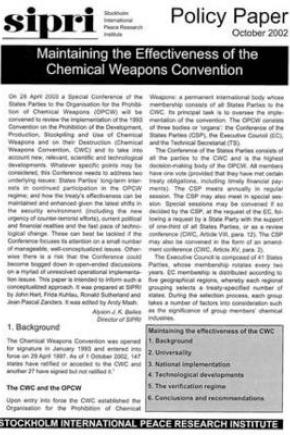Maintaining the Effectiveness of the Chemical Weapons Convention
On 28 April 2003 a Special Conference of the States Parties to the Organisation for the Prohibition of Chemical Weapons (OPCW) will be convened to review the implementation of the 1993 Convention on the Prohibition of the Development, Production, Stockpiling and Use of Chemical Weapons and on their Destruction (Chemical Weapons Convention, CWC) and to take into account new, relevant, scientific and technological developments.
Whatever specific points may be considered, this Conference needs to address two underlying issues: States Parties' long-term interests in continued participation in the OPCW regime; and how the treaty's effectiveness can be maintained and enhanced given the latest shifts in the security environment (including the new urgency of counter-terrorist efforts), current political and financial realities and the fast pace of technological change. These can best be tackled if the Conference focuses its attention on a small number of manageable, well-conceptualized issues. Otherwise there is a risk that the Conference could become bogged down in open-ended discussions on a myriad of unresolved operational implementation issues. This paper is intended to inform such a conceptualized approach.
1. Background
2. Universality
3. National implementation
4. Technological developments
5. The verification regime
6. Conclusions and recommendations


